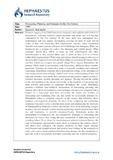| dc.description.abstract | Products ranging from Fifth Generation computers and sophisticated robotics to inexpensive, superfast wireless communications and smart cars will become widespread by the 21st century. At the same time, now unimagined new technologies will also appear. Automation, covering all areas of work and all walks of life, will drastically shift employment patterns, while unattended factories and expert systems will pose novel challenges for managers. What can businesses do to prepare for such a fast-changing and volatile future? What strategies should they follow to keep up with technological and other breakthroughs as they unfold? What type of skills do they need to cultivate within their organizations? What steps and actions should managers take now to improve their chances of survival and their ability to succeed in the future? How can they effectively compete in a global village?Now, Spyros Makridakis, the pioneer whose name is synonymous with forecasting, addresses these complex questions. Drawing on twenty-five years of research, teaching, and corporate consulting, Makridakis contends that a thorough knowledge of the principles of forecasting and decision making, coupled with a basic understanding of how and why past mistakes were made, has a pronounced and positive impact on future-oriented decisions, notably planning and strategy. Moving beyond his earlier work, and building on his unique knowledge of the methods of forecasting and their real-life applications in companies throughout the world, Makridakis presents a brilliant, non-technical reassessment of forecasting, planning, and strategy that will be welcomed by every manager who has ever struggled with a budget or a long-range plan.After presenting the myths and realities of forecasting and explaining what can and cannot be successfully planned for, Makridakis offers a complete analysis of the factors that influence short, medium, and long-term planning. He does so by comparing and contrasting economic long-term cycles to shorter-term trends and emphasizing the necessity of distinguishing temporary cyclical movements from those indicating changes in trends. He also presents various analytical planning models and discusses their use and limitations in real-life situations.Finally, Makridakis probes the relationship of competitive and non-competitive strategies to forecasting and discusses the factors that during the past contributed to achieving success or avoiding failure. He explores, by examining past patterns in human history, the type of businesses and managers most likely to emerge in the coming century and shows how managers can employ creativity as their major strategic tool.Practical and straightforward, this book is must reading for the managers of today who want to better understand forthcoming changes and their implications, and who wish to successfully lead their companies into the world of tomorrow. | en_UK |


